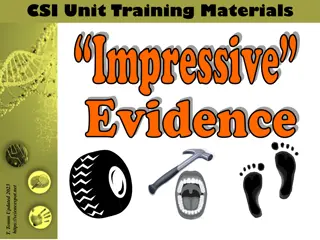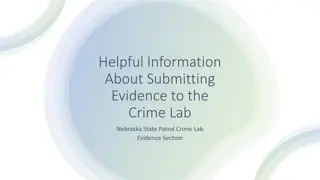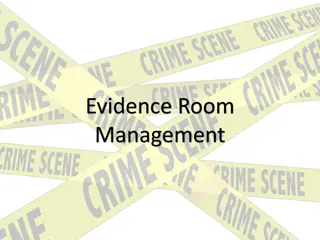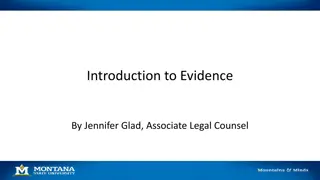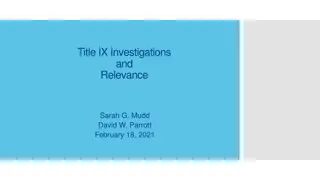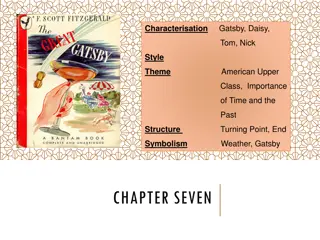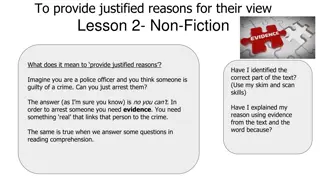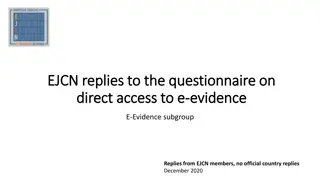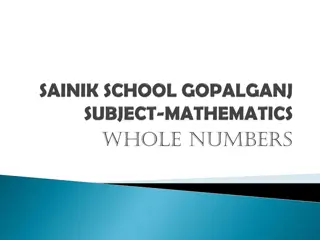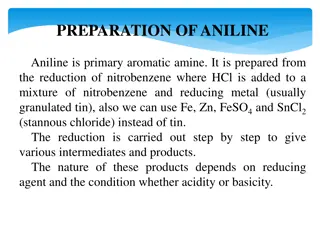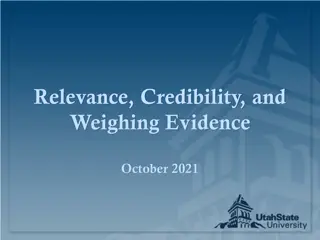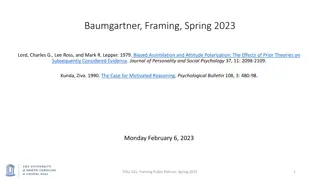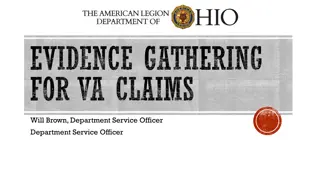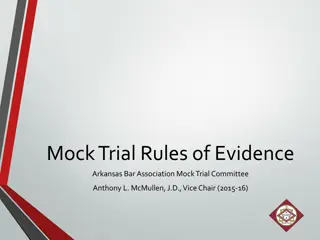Illegally obtained evidence
Illegally obtained evidence refers to evidence acquired through unlawful means, such as searches without warrants or extraction under duress. The Fruit of the Poisonous Tree doctrine renders evidence inadmissible if derived from illegally obtained evidence. The Exclusionary Rule prohibits the use of evidence gathered in violation of the US Constitution, safeguarding against unreasonable searches and seizures. Key amendments like the Fourth and Fifth protect individuals from unlawful intrusion of privacy and self-incrimination, reinforcing the importance of due process.
Download Presentation

Please find below an Image/Link to download the presentation.
The content on the website is provided AS IS for your information and personal use only. It may not be sold, licensed, or shared on other websites without obtaining consent from the author.If you encounter any issues during the download, it is possible that the publisher has removed the file from their server.
You are allowed to download the files provided on this website for personal or commercial use, subject to the condition that they are used lawfully. All files are the property of their respective owners.
The content on the website is provided AS IS for your information and personal use only. It may not be sold, licensed, or shared on other websites without obtaining consent from the author.
E N D
Presentation Transcript
Definition Illegally obtained evidence - Evidence directly obtained by some means contrary to law. e.g. search without a warrant, torture during interrogation Indirectly illegal evidence should be distinguished from directly illegal evidence. Important note: not every violation of law should have the same consequences and e.g. leads to prohibition of using certain evidence.
Definition Fruit of the poisonous tree - a doctrine that extends the exclusionary rule to make evidence inadmissible in court if it was derived from evidence that was illegally obtained. Like the exclusionary rule itself, this doctrine is subject to three important exceptions. The evidence will not be excluded: if it was discovered from a source independent of the illegal activity; its discovery was inevitable; or if there is attenuation between the illegal activity and the discovery of the evidence; Police or other criminal proceedings authority acted in good faith. https://www.law.cornell.edu/wex/fruit_of_the_poisonous_tree
Definition The exclusionary rule prevents the government from using most evidence gathered in violation of the United States Constitution. The decision in Mapp v. Ohio established that the exclusionary rule applies to evidence gained from an unreasonable search or seizure in violation of the Fourth Amendment. The decision in Miranda v. Arizona established that the exclusionary rule applies to improperly elicited self-incriminatory statements gathered in violation of the Fifth Amendment, and to evidence gained in situations where the government violated the defendant's Sixth Amendment right to counsel https://www.law.cornell.edu/wex/exclusionary_rule
Fourth amendement The right of the people to be secure in their persons, houses, papers, and effects, against unreasonable searches and seizures, shall not be violated, and no Warrants shall issue, but upon probable cause, supported by Oath or affirmation, and particularly describing the place to be searched, and the persons or things to be seized.
Fifth amendment No person shall be held to answer for a capital, or otherwise infamous crime, unless on a presentment or indictment of a Grand Jury, except in cases arising in the land or naval forces, or in the Militia, when in actual service in time of War or public danger; nor shall any person be subject for the same offence to be twice put in jeopardy of life or limb; nor shall be compelled in any criminal case to be a witness against himself, nor be deprived of life, liberty, or property, without due process of law; nor shall private property be taken for public use, without just compensation.
Miranda v. Arizona The Supreme Court s decision in Miranda v. Arizona addressed four different cases involving custodial interrogations. In each of these cases, the defendant was questioned by police officers, detectives, or a prosecuting attorney in a room in which he was cut off from the outside world. In none of these cases was the defendant given a full and effective warning of his rights at the outset of the interrogation process. In all the cases, the questioning elicited oral admissions and, in three of them, signed statements that were admitted at trial. Miranda was found guilty of kidnapping and rape and was sentenced to 20-30 years imprisonment on each count. On appeal, the Supreme Court of Arizona held that Miranda s constitutional rights were not violated in obtaining the confession. Miranda v. Arizona: After Miranda s conviction was overturned by the Supreme Court, the State of Arizona retried him. At the second trial, Miranda s confession was not introduced into evidence. Miranda was once again convicted and sentenced to 20-30 years in prison. https://www.uscourts.gov/educational-resources/educational-activities/facts- and-case-summary-miranda-v-arizona
Should evidence obtained in breach of the law be admissible in a trial or not?
Arguments for the admissibility of evidence obtained in violation of the law: 1. the need to achieve the objectives of the criminal trial, understood as the achievement of a state of substantive justice (everyone who commit a crime should be punished) 2. the desire to protect the interests of victims of crime 3. violations of individual rights in gathering evidence is a separate issue from the question of its admissibility in a criminal trial (sanctions outside the trial) 4. deficiencies in the activities of law enforcement authorities do not spill over into the activities of the court (so if the Police violated some rights, it should not have any influence of the court activity) 5. the protection of the public interest in a properly functioning and trustworthy justice system See: presentation made by prof. W. Jasi ski
Arguments for the inadmissibility of evidence obtained in violation of the law: Credibility of evidence (physical evidence vs. personal evidence - can evidence obtained under torture be credible?) Rule of law (different nature and purpose of legal norms, so also different consequences of violations) Protection of individual rights Deterrence of procedural authorities from violating the law (deterrence principle) Moral integrity of the judiciary - behaviour of procedural authorities contrary to the law undermines the moral legitimacy of the administration of justice (the court becomes an accomplice to violations by accepting them) See: presentation made by prof. W. Jasi ski
Definition The exclusionary rule - more general definition Legislation, case law practice that prohibits the use as evidence of information, things, etc. obtained in violation of the law. Not every violation of the law has the same gravity. We will evaluate differently, for example, a violation of the night time during a search, and a search without legal grounds.
While Article 6 guarantees the right to a fair hearing, it does not lay down any rules on the admissibility of evidence as such, which is primarily a matter for regulation under national law (Schenk v. Switzerland, 45-46). Evidence, rules of admissibility of evidence depend on national law, as well as on traditions, customs and procedural practices. Evidence and ECtHR
Evidence and ECtHR The question which must be answered is whether the proceedings as a whole, including the way in which the evidence was obtained, were fair (Ayetullah Ay v. Turkey, 123- 130). This involves an examination of the alleged unlawfulness in question and, where the violation of another Convention right is concerned, the nature of the violation found (Khan v. the United Kingdom, 34). So, formally the ECtHR does not interfere with the principles and conditions of admissibility of evidence - in practice, however, it sets limits to interference in the sphere of individual rights and freedoms.
Evidence and ECtHR In determining whether the proceedings as a whole were fair, regard must also be had to whether the rights of the defence have been respected. - the use of evidence obtained through an identification parade (Laska and Lika v. Albania), - an improper taking of samples from a suspect for a forensic analysis (Horvati v. Croatia), - exertion of pressure on a co-accused (Erkapi v. Croatia; Dominka v. Slovakia (dec.); Stephens v. Malta (no. 3), 64-67; - use of planted evidence against an accused (Layijov v. Azerbaijan, 64; Sakit Zahidov v. Azerbaijan, 46-49; Kobiashvili v. Georgia, 56-58), - unfair use of other incriminating witness and material evidence against an accused (Ilgar Mammadov v. Azerbaijan (no. 2); Ayetullah Ay v. Turkey); - use of self-incriminating statements in the proceedings (Belugin v. Russia, 68-80) remember about access to a lawyer; - and use of expert evidence in the proceedings (Erduran and Em Export D Tic A. . v. Turkey, 107-112)
Kobiashvili v. Georgia 61. In the current case the personal search of the applicant was conducted, in the absence of a prior judicial warrant, on the basis of a decision issued by the head of the relevant police department on 4 July 2004. That was a valid procedure to be followed in exigent circumstances, as provided for under Article 290 2 and 4 of the CCP. The Court notes, however, that the decision, without referring to any relevant factual circumstances, simply consisted of a pre-typed text with the applicant s full name added by hand and a note that he was suspected of unlawful drugs possession. It explicitly identified the applicant by his name and address, whereas the police officers who conducted the search on the basis of that decision consistently claimed throughout the operational information at their disposal before the search had simply stated that a certain person at a certain address had been under the influence of drugs (see paragraphs 22- 28 above). Furthermore, the decision was not substantiated as it did not give the exigent circumstances that allegedly necessitated an urgent search without a prior judicial warrant. It appears that the concrete circumstances (information) triggering the urgent search of the applicant in the absence of a prior judicial warrant were not identified at a later stage either, as the criminal case file compiled against the applicant did not contain the relevant inquiry file and/or the this respect paragraphs 68 and 69 below). The relevant police officers also failed to shed light on the matter (see for their statements paragraphs 12, 22 and 28 above). Thus the pre-search circumstances were left unidentified. the domestic proceedings that operational information (see in rather general and inconsistent
Kobiashvili v. Georgia 65. To sum up, in the absence of prior judicial authorisation and in view of the prima facie deficient officers superior, given the fact that the inquiry file against the applicant and/or the operational information that allegedly triggered the search were missing from the case file, and having regard to the inconsistent and conflicting evidence concerning the actual circumstances of the personal search, the Court concludes that the manner in which the search was carried out cast doubt on the reliability and accuracy of the evidence obtained as a result (see Lisica, 60, and Zahidov, 55, both cited above; contrast with Drago Ioan Rusu v. Romania, no. 22767/08, 54, 31 October 2017, and Prade cited above, 39, in which the applicants never contested the reliability and accuracy of the evidence as such). authorisation from the police
Evidence and ECtHR The ECtHR does not impose a system of disqualifications of evidence (exclusionary rule) - this would jeopardise the differences that exist between countries.But it does not mean that it is impossible to identify some general rules cosidering the problem of evidence. M. W sek-Wiaderek points out that in the case law of the ECHR two groups of sui generis evidentiary limitations (exclusionary rule) may be distinguished: - sensu stricto - the use as evidence of things, information, statements always results in an unfairness of the proceedings, a violation of the ECHR - sensu largo - the impact of the violation on the general fairness of the proceedings is examined; there is no automatic approach.
Exclusionary rule sensu stricto 1)the inadmissibility of the use as evidence of statements obtained from a person as a direct result of tortur (Article 3); 2)the inadmissibility of the use in evidence of statements obtained from a person as a direct result of inhuman or degrading treatment (Article 3); 3)inadmissibility of the use of evidence other than statements or confessions (i.e. substantive evidence) obtained directly as a result of torture (Article 3); 4)inadmissibility of the use of evidence obtained as a result of a defectively conducted fake transaction, which consisted in inciting the accused to commit a criminal act (Article 8) entrampment See also: article 15 ECHR
Exclusionary rule sensu largo 1)the inadmissibility (in general) of the use in criminal proceedings of material (substantive) evidence obtained as a direct result of a violation of the prohibition of inhuman or degrading treatment (Article 3); 2)the inadmissibility (in general) of the use in criminal proceedings of evidence obtained indirectly as a result of inhuman treatment (i.e. the so-called "fruit of the poisoned tree") (Article 3); Jalloh case 3)the relative admissibility of the use in criminal proceedings of evidence obtained in violation of the right to privacy (Article 8 of the Convention) or of the procedural requirements for conducting it.
Khan v. UK. 30. The applicant does not submit that Article 6 requires an automatic rule of exclusion of evidence obtained in consequence of a breach of Article 8, but argues that where evidence has been obtained in breach of a Convention right, three requirements must be fulfilled by the domestic courts: there must be an effective procedure during the trial by which the applicant can challenge the admissibility of evidence; the trial court should have regard to the nature of the violation; and the conviction should not be based solely on evidence obtained in consequence of a breach of a Convention right. The applicant argues that the procedure under section 78 of PACE is not capable of affording a ground for the exclusion of evidence, given that the House of Lords' judgment indicates that a breach of Article 8 was not capable of affording a ground for the exclusion of evidence under that section. He submits that the absence of an effective procedure, by which he could challenge the use of evidence obtained in breach of Article 8, is in breach of Article 6 of the Convention. 31. The applicant further submits that the nature of the breach amounted to a fundamental violation of the Convention as there was a complete absence of a statutory scheme regulating the use of secret aural surveillance devices by the police. Finally, the applicant contends that it is contrary to the rule of law to permit a criminal conviction to be based solely on evidence obtained by illegal acts of law-enforcement agents. He maintains that he can still claim to be the victim of a violation of the right to a fair hearing even though he was in fact guilty and pleaded guilty to the offence with which he had been charged. In the present circumstances, if the evidence had been excluded as inadmissible by the trial court, the prosecution would have discontinued the proceedings. The applicant submits that the Court's role is not to determine whether or not there was a miscarriage of justice but whether or not the applicant, innocent or guilty, received a fair trial.
Khan v. UK 36. The Court notes at the outset that, in contrast to the position examined in the Schenk case, the fixing of the listening device and the recording of the applicant's conversation were not unlawful in the sense of being contrary to domestic criminal law. In particular, as Lord Nolan observed, under English law there is in general nothing unlawful about a breach of privacy. Moreover, as was further noted, there was no suggestion that, in fixing the device, the police had operated otherwise than in accordance with the Home Office Guidelines. In addition, as the House of Lords found, the admissions made by the applicant during the conversation with B. were made voluntarily, there being no entrapment and the applicant being under no inducement to make such admissions. The unlawfulness of which complaint is made in the present case relates exclusively to the fact that there was no statutory authority for the interference with the applicant's right to respect for private life and that, accordingly, such interference was not in accordance with the law , as that phrase has been interpreted in Article 8 2 of the Convention. 37. The Court next notes that the contested material in the present case was in effect the only evidence against the applicant and that the applicant's plea of guilty was tendered only on the basis of the judge's ruling that the evidence should be admitted. However, the relevance of the existence of evidence other than the contested matter depends on the circumstances of the case. In the present circumstances, where the tape recording was acknowledged to be very strong evidence, and where there was no risk of it being unreliable, the need for supporting evidence is correspondingly weaker. It is true that, in the case of Schenk, weight was attached by the Court to the fact that the tape recording at issue in that case was not the only evidence against the applicant. However, the Court notes in this regard that the recording in the Schenk case, although not the only evidence, was described by the Criminal Cassation Division of the Vaud Cantonal Court as having a perhaps decisive influence, or at the least a not inconsiderable one, on the outcome of the criminal proceedings (ibid., pp. 19-22, 28). Moreover, this element was not the determining factor in the Court's conclusion.
Prohibition of torture, inhuman/degreeding treatment The prohibition of torture as expressed in Article 3 of the Convention is absolute and universal. States parties to the Convention cannot exempt themselves from this prohibition even in a state of war or other public danger threatening the life of the nation (Article 15 of the Convention). 1. In time of war or other public emergency threatening the life of the nation any High Contracting Party may take measures derogating from its obligations under this Convention to the extent strictly required by the exigencies of the situation, provided that such measures are not inconsistent with its other obligations under international law. 2. No derogation from Article 2, except in respect of deaths resulting from lawful acts of war, or from Articles 3, 4 (paragraph 1) and 7 shall be made under this provision See: https://www.echr.coe.int/documents/guide_art_15_eng.pdf
Jalloh v. Germany Incriminating evidence, whether in the form of a confession or material evidence obtained as a result of acts of violence, brutality or other conduct amounting to torture, may in no circumstances be used as evidence of guilt, regardless of its probative value [i.e. its relevance to the possibility of establishing guilt]". To accept any other thesis would constitute an indirect justification of conduct deserving of moral condemnation, which the drafters of Article 3 of the Convention intended to prohibit, or, as neatly expressed in the United States Supreme Court's judgment in Rochin, "[...] would amount to placing the cloak of law on brutality.
Prohibition of torture, inhuman/degreeding treatment The prohibition of torture is absolute and applies to the use of evidence that -may have been (there is a real risk of being) obtained as a result of torture/inhuman or degrading treatment in another State. Whether or not that State is party to the ECHR. (El-Haski v. Belgium; Othman (Abu Qatada) v. United Kingdom). Procedural authorities are not allowed to use evidence obtained as a result of torture by private individuals e.g. members of a criminal group ( wik v. Poland). It does not matter the gravity of the case, the seriousness of the crime, whether, for example, the use of torture would not have helped to save the kidnapped child; Gafgen v. Germany https://policehumanrightsresources.org/gafgen-v-germany-application- no-22978-05
Torture - definition Article 1 1. For the purposes of this Convention, the term "torture" means any act by which severe pain or suffering, whether physical or mental, is intentionally inflicted on a person for such purposes as obtaining from him or a third person information or a confession, punishing him for an act he or a third person has committed or is suspected of having committed, or intimidating or coercing him or a third person, or for any reason based on discrimination of any kind, when such pain or suffering is inflicted by or at the instigation of or with the consent or acquiescence of a public official or other person acting in an official capacity. It does not include pain or suffering arising only from, inherent in or incidental to lawful sanctions. 2. This article is without prejudice to any international instrument or national legislation which does or may contain provisions of wider application. UN Convention against Torture and Other Cruel, Inhuman or Degrading Treatment or Punishment (10.12.1984)
S. Sykuna, Tortury w XXI w., Gdask 2013 "In the modern debate on this topic, perhaps the most spectacular example of using the concept of torture techniques and introducing it into the public discourse was the proposal of Alan M. Dershowitz. In regard to the terrorist threat, this author allowed for the possibility that, with judicial authorization, certain services would have the competence to interrogate suspects more 'hard', using certain techniques to do so. Alan M. Dershowitz, did not stop at just general postulates, but proposed explicitly certain forms of interrogation, including inserting sterilised needles under the suspect's fingernails. Aware of the negative reaction to his proposal, he defended it by building some comparison with the execution of the death penalty. He wrote explicitly that death is underestimated and pain overestimated in modern times. As it seems, for Alan M. Dershowitz, the manner in which an activity is carried out, including interrogation techniques, can mitigate its public perception. Modern techniques of capital punishment, which involve putting the condemned person to sleep by administering an appropriate agent, have made "the aesthetics of death more satisfying". Why then could it not be the same with torture? If their techniques are changed, it may be that people are far more quickly willing to accept them. This author argued that this is all the more likely if one realises that death is something final and pain is only something transient .
Entrapment If the accused alleges that he was induced to commit the offence, the court must conduct a careful examination of the evidence in the file, as it is a condition of the fairness of the proceedings within the meaning of Article 6(1) of the Convention that all evidence obtained as a result of police inducement must be excluded from further proceedings. The fulfilment of this condition is of particular importance where the police action was initiated without providing a sufficient legal basis or adequate safeguards against abuse. 232. The Court has recognised the need for the authorities to have recourse to special investigative methods, notably in organised crime and corruption cases. It has held, in this connection, that the use of special investigative methods in particular, undercover techniques does not in itself infringe the right to a fair trial. However, on account of the risk of police incitement entailed by such techniques, their use must be kept within clear limits (Ramanauskas v. Lithuania [GC], 51).
Entrapment 233. While the rise of organised crime requires the States to take appropriate measures, the right to a fair trial, from which the requirement of the proper administration of justice is to be inferred, nevertheless applies to all types of criminal offence, from the most straightforward to the most complex. The right to the fair administration of justice holds so prominent a place in a democratic society that it cannot be sacrificed for the sake of expedience (ibid., 53). In this connection, the Court has emphasised that the police may act undercover but not incite (Khudobin v. Russia, 128). 239. In its case-law on the subject of entrapment, the Court has developed criteria to distinguish entrapment breaching Article 6 1 of the Convention from permissible conduct in the use of legitimate undercover techniques in criminal investigations. The Court has explained that whereas it is not possible to reduce the variety of situations which might occur in this context to a mere checklist of simplified criteria, the Court s examination of complaints of entrapment has developed on the basis of two tests: the substantive and the procedural test of incitement (Matanovi v. Croatia, 122; Ramanauskas v. Lithuania (no. 2), 55).
State positive obligation in gathering evidence It should be noted that in some instances, a positive obligation may arise on the part of the authorities to investigate and collect evidence in favour of the accused. In V.C.L. and A.N. v. the United Kingdom, 195-200, concerning a case of human trafficking where the victims of trafficking were prosecuted for drug-related offences (committed in relation to their trafficking), the Court stressed that evidence concerning an accused s status as a victim of trafficking should be considered as a fundamental aspect of the defence which he or she should be able to secure without restriction. In this connection, the Court referred to the positive obligation on the State under Article 4 of the Convention to investigate situations of potential trafficking.5 In the case at issue, the Court considered that the lack of a proper assessment of the applicants status as victims of trafficking prevented the authorities from securing evidence which may have constituted a fundamental aspect of their defence. https://www.echr.coe.int/documents/guide_art_6_criminal_eng.pdf, p. 45



